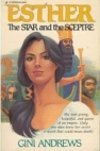
Gini Andrews
Auteur de Esther: The star and the sceptre : a novel
Œuvres de Gini Andrews
Étiqueté
Partage des connaissances
- Sexe
- female
- Lieux de résidence
- England, UK
Membres
Critiques
Vous aimerez peut-être aussi
Auteurs associés
Statistiques
- Œuvres
- 4
- Membres
- 338
- Popularité
- #70,454
- Évaluation
- 2.9
- Critiques
- 4
- ISBN
- 14
- Langues
- 3









